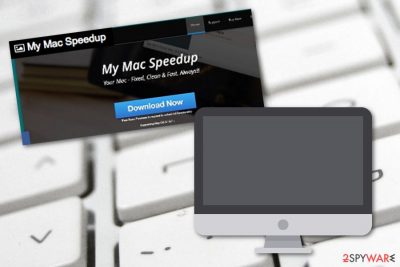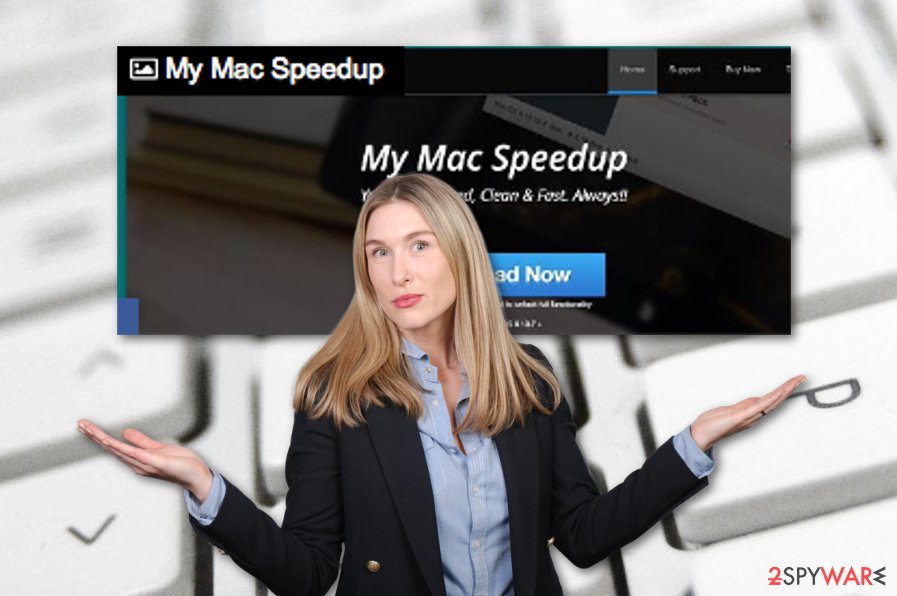My Mac Speedup (Free Instructions)
My Mac Speedup Removal Guide
What is My Mac Speedup?
My Mac Speedup – a rogue system program that claims to fix system issues but truly does not

My Mac Speedup is an unreliable computer tool[1] that is created to suit Mac devices. Even though this program promises to fix all system-related issues and clean the computer, it truly does none of these things. The potentially unwanted program displays misleading alerts about computer infections and other problems that were found after the scan.
Later on, the program offers to purchase the licensed version of the tool in order to speed up, clean, and fix the system. However, all of this is just another lie and a trick to convince gullible users to purchase completely useless software. Even though this rogue computer optimization program offers you a lot of beneficially-looking features, be wise and try not to accept any offers that are provided by the PUP.
| Name | My Mac Speedup |
|---|---|
| Category | System tool |
| Sub-category | PUP |
| Target | Apple devices |
| Goal | To trick users to buy the licensed version of the program |
| Claimed features | Cache Manager, Trash Manager, Logs Manager, Uninstaller, and some others |
| Spreading techniques | Official site, bundling, unprotected links, third-party pages |
| REMOVAL PROCESS | Remove the intruder within a couple of minutes with security software |
| System health | Use FortectIntego fix any system-related inconsistencies |
It is known that the article's culprit claims to have these features:
- Cache Manager.
- Trash Manager.
- Logs Manager.
- Uninstaller.
- etc.
If you decide to pay for the licensed version of the program, it will install on your system and imitate a fix. However, no particular changes will be done to your computer. If you want to scan for real issues, you should use reliable computer programs and measure the given results with the ones that were provided by My Mac Speedup.
Additionally, the PUP will keep on posting notifications if you do not get rid of it. It will still keep on advertising the rogue tool and claim that your computer system needs fixing again. These pop-ups[2] might appear to be extremely annoying and intruding as they might cause computer work struggles while performing some important tasks.
Because of the program's uselessness and unwanted activities, we recommend proceeding with its removal. You can use specific computer tools such as SpyHunter 5Combo Cleaner and Malwarebytes to eliminate the computer system optimization tool, or you can find some instructions below this text which show how to get rid of the potentially unwanted application from your device.
Before you remove My Mac Speedup virus, you should detect all adware-related components in the system. For this purpose, try using a computer tool such as FortectIntego. However, you can feel free to use any other software if you are likely to. Note that, fake computer programs are very likely to secretly infiltrate the system, so, be careful when you browse the web next time.

Distribution ways of rogue computer software
If you are wondering where did the odd computer tool come from, we can ensure you that there are several ways for PUP distribution to succeed. However, the most popular ones are:
- unprotected third-party[3] web pages;
- secondary downloading sources;
- regular software packages;
- official pages.
According to technology specialists,[4] all of these distribution sources can be avoided. It is very important that the user takes some actions of her/his own to protect their computer systems. First, make sure that you have antivirus protection installed on your computer as these tools will take care of the system and not let any rogue content to slip in.
Second, stay away from unprotected web pages as far as possible. Do not click on any links that you are not able to recognize or which are suspicious-looking to you. Last but not least, use the Custom or Advanced installation mode for your software. Always keep an eye on your incoming downloads and do not let any rogue components to slip in.
My Mac Speedup virus elimination techniques
If you want to remove My Mac Speedup virus from your computer, you should better lean on automatical computer security and fixing tools if you lack experience in such elimination spheres. All you need to do is choose a reputable computer program and it will complete all the work for you just in a couple of minutes.
The removal requires full attention. You need to ensure that your Mac machine is fully cleaned, that no rogue processes are running, and no suspicious-looking content is hiding in the system. Once you do that, make sure that you memorize all PUP-avoiding steps and be more careful on the Internet sphere in the nearest future.
You may remove virus damage with a help of FortectIntego. SpyHunter 5Combo Cleaner and Malwarebytes are recommended to detect potentially unwanted programs and viruses with all their files and registry entries that are related to them.
Getting rid of My Mac Speedup. Follow these steps
Delete from macOS
Remove items from Applications folder:
- From the menu bar, select Go > Applications.
- In the Applications folder, look for all related entries.
- Click on the app and drag it to Trash (or right-click and pick Move to Trash)

To fully remove an unwanted app, you need to access Application Support, LaunchAgents, and LaunchDaemons folders and delete relevant files:
- Select Go > Go to Folder.
- Enter /Library/Application Support and click Go or press Enter.
- In the Application Support folder, look for any dubious entries and then delete them.
- Now enter /Library/LaunchAgents and /Library/LaunchDaemons folders the same way and terminate all the related .plist files.

After uninstalling this potentially unwanted program (PUP) and fixing each of your web browsers, we recommend you to scan your PC system with a reputable anti-spyware. This will help you to get rid of My Mac Speedup registry traces and will also identify related parasites or possible malware infections on your computer. For that you can use our top-rated malware remover: FortectIntego, SpyHunter 5Combo Cleaner or Malwarebytes.
How to prevent from getting adware
Do not let government spy on you
The government has many issues in regards to tracking users' data and spying on citizens, so you should take this into consideration and learn more about shady information gathering practices. Avoid any unwanted government tracking or spying by going totally anonymous on the internet.
You can choose a different location when you go online and access any material you want without particular content restrictions. You can easily enjoy internet connection without any risks of being hacked by using Private Internet Access VPN.
Control the information that can be accessed by government any other unwanted party and surf online without being spied on. Even if you are not involved in illegal activities or trust your selection of services, platforms, be suspicious for your own security and take precautionary measures by using the VPN service.
Backup files for the later use, in case of the malware attack
Computer users can suffer from data losses due to cyber infections or their own faulty doings. Ransomware can encrypt and hold files hostage, while unforeseen power cuts might cause a loss of important documents. If you have proper up-to-date backups, you can easily recover after such an incident and get back to work. It is also equally important to update backups on a regular basis so that the newest information remains intact – you can set this process to be performed automatically.
When you have the previous version of every important document or project you can avoid frustration and breakdowns. It comes in handy when malware strikes out of nowhere. Use Data Recovery Pro for the data restoration process.
- ^ Rogue Security Software. Express VPN. Info.
- ^ Pop-up notification. Wikipedia. The free encyclopedia.
- ^ Margaret Rouse. Third party. What is. Tech Target.
- ^ Virusler.info.tr. Virusler. All about the Internet sphere and technology.


